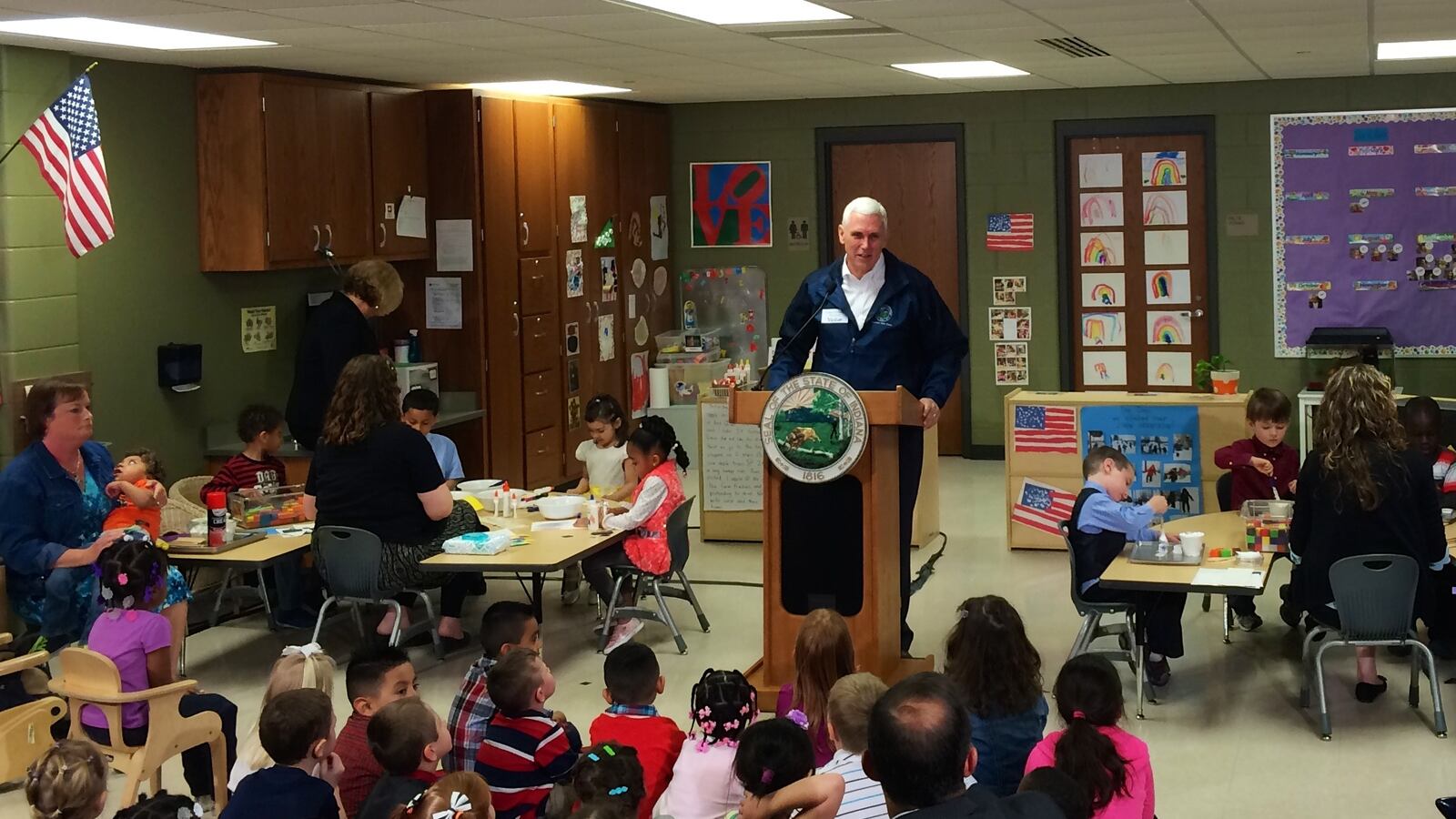Public funding for early childhood education in Indiana expanded once again today as Gov. Mike Pence announced the state’s new preschool pilot would grow by nearly 600 more seats this fall.
The announcement is one more piece of good news for preschool advocates in Indiana recently who think the state is long overdue in its investment of Indiana’s youngest learners:
- Pence’s announcement today follows the Indiana legislature’s approval last year of the state’s first program offering state aid for preschool in five cities.
- Indianapolis recently approved its own $40 million public-private effort to support preschool tuition for poor children.
- School districts and private preschools are making headway toward expanding preschool services.
But the momentum raises a big question: Now that some public funding is available for preschool, are there enough high quality preschools to serve more children who are expected to enroll?
In fact, Indiana has a ways to go if it wants far more children to begin learning basic skills before they start school in kindergarten.
Some of the state’s top preschool advocates and experts say several practical hurdles stand in the way. Today, they say there simply aren’t enough high-quality preschools — and adding more will depend heavily on the state’s ability to attract quality preschool teachers, train them effectively and keep them in the workforce.
A public event Saturday at Butler University featuring the state’s top preschool advocates hosted by Chalkbeat will address those issues and aim to shed light on the future direction of preschool in the state.
Bureau Chief Scott Elliott will moderate a panel that includes Indianapolis’ Deputy Mayor for Education Jason Kloth, Early Learning Indiana President Ted Maple, Butler University College of Education Dean Ena Shelley and Flanner House Child Development Director Shalonda Murray.
The event, which is from noon to 2 p.m. at Butler’s Eidson-Duckwall Recital Hall, is free and open to the public. (For more details, go here. Butler, WFYI, Kroger, the American Graduate Project and the Corporation for Public Broadcasting are sponsoring the event.)
“Obviously, this is a great first step,” Maple said of the recent preschool expansion efforts. “It’s a big first step, but it’s not going to serve all the children that need high-quality early childhood education. Every leader that I’ve heard talk about this has acknowledged this.”
Pence’s announcement today is built on a new public-private partnership between the state and outside groups. Early Learning Indiana contributed $150,000 in grants as part of a total $435,000 investment to 40 providers around the state so more than 580 children could be added to those programs. The state contributed about $185,000 to the effort. United Way of Central Indiana and Lilly Endowment also supported the expansion.
“These kids are going to have a brighter future because of the people involved in this process,” Pence said during a press conference today at a preschool run by Wayne Township Schools.
Despite the progress, Maple said early learning advocates are still hoping for more substantial public funding.
“There’s a bigger long-term investment needed from the state,” Maple said.Less than 15 percent of 800 preschool centers in Indianapolis are considered to be high quality on Indiana’s rating system, called Paths to Quality. Kloth’s focus is on improving that number.
Kloth said the state and city programs must aim to maintain a balance of public, private, church and community center-run preschools. Private preschools, he said, are a critical part of the city’s preschool market.
“If all school districts provided this and that change occurred quickly, you could devastate the childcare market,” Kloth said. “You want to be sensitive of the unintended consequences of the changes you make.”
That’s because preschool helps offset the more expensive cost of infant care in child care centers, he said.
“If you took all the preschool-aged children out of the child cares, their cost structure would fall apart,” Kloth said. “They wouldn’t have the three- and four-year-olds to offset the more expensive infants.”
And the longterm success of expanded preschool cannot be maintained without skilled teachers specially trained in early childhood education, Shelley said. Treating preschool teachers as professionals equal to teachers in school systems would make a big difference.
But today, most privately run preschools pay teachers by the hour, Shelley said, and that won’t cut it.
“A lot of people really want to do this work but they can’t afford to take the salaries,” Shelley said. “How do you say to someone ‘You’ve just … completed a very rigorous program, but you’re going to go out and make minimum wage?’ That is not a sustainable financial model.”
Murray, who came to Flanner House after running Auntie Mame’s Child Development Center, said she has faced that problem throughout her career managing private preschools. She said new funding for preschool could help stabilize the field.
“The professionals who are available may have little exposure and little education,” Murray said. “There are a lot of deficits that need to be addressed.”
Applications for the state and city programs are due April 30. To R.S.V.P. for Chalkbeat’s event or to find more information, click here.

